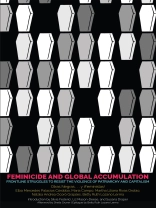Femicide and Global Accumulation brings us to the frontlines of an international movement of Black, Indigenous, popular, and mestiza women’s organizations fighting against violence—interpersonal, state sanctioned, and economic—that is both endemic to the global economy and the contemporary devalued status of racialized women, trans, and gender non-conforming communties in the Global South.
These struggles against racism, capitalism, and patriarchy show how crucially linked the land, water, and other resource extraction projects that criss-cross the planet are to devaluing labor and nature and how central Black and Indigneous women and trans leadership is to its resistance.
The book is based on the first ever International Forum on Feminicide among ethnicized and racialized groups—which brought together activists and researchers from Colombia, Guatemala, Italy, Brazil, Iran, Guinea Bissau, Bolivia, Canada, the U.S., Ecuador, Spain, Mexico, among other countries in the world to represent different social movements and share concrete stories, memories, experiences and knowledge of their struggles against racism, capitalism and patriarchy.
Femicide and Global Accumulation reflects, in a collective fabric, the communitarian and enraged struggles of women, trans, and gender non-conforming communties who commit themslves to the transformation of their communities by directly challenging the murder and assassination of women and violence in all its forms.
Cuprins
Acknowledgments
Preface
Colectivos Otras negras… y¡Feministas!
Introduction
Silvia Federici, Liz Mason-Deese, Susana Draper
Chapter 1: Horizon of Reflection: Context and conceptualization of femicide
Evoking our ancestors: Homage to our maroon heritage
Asociación Casa Cultural El Chontaduro
Victims of development, Afro-urban communities and dynamics of re-existence in Buenaventura
Danelly Estupiñán Valencia
Chapter 2: Pedagogies of cruelty
Gender and violence in the apocalyptic phase of capital: New reflections in light of the historical transformations of our time.
Rita Segato
The female body and the territorial body
Alejandra Rangel and Valentina García; Clemencia Fory and Catherine Loboa; María Mercedes Campo and Betty Ruth Lozano
The Uncertainty of femicides in transwomen: Approaches to transgenocides in racialized women
Alejandra Rangel Oliveros and Valentina García Marín
Mobilization of Black women for the care of life and the ancestral territories of the north of Cauca
Clemencia Fory Banguero and Katherine Loboa
Pumpkin, squash, each for her home
María Mercedes Campo, Colectivos Otras negras… y¡Feministas! and Sentipensar Afrodiaspórico
Conquest of territories and subjectivities
Betty Ruth Lozano, Colectivos Otras negras… y¡Feministas!
Sexual violence in the genocide against the Mayan People of Guatemala
Aura Cumes
Violence, women, accumulation and racism: Canada and colonialism to Colombia
Sheila Gruner
Chapter 3: A Re-inventory of Pedagogies
Memories of violence: Women, resistance and identity construction in Guinea Bissau
Patricia Godinho Gomes
Strategies for “re-existence” among violence (National Panel)
Blanca Astrid Secué and Isaura Sauce; Vicenta Moreno and Ofir Muñoz and Elba Mercedes Palacios Córdoba
Transforming the pain of femicide into a fight for justice
Helen Álvarez
Women facing the violence of imperialism and fundamentalism in the Middle East
Shahrzad Mojab
Chapter 4: Strategies to face femicide
Globalization, capital accumulation and violence against women: An international and historical perspective
Silvia Federici
Experiences and difficulties in accessing and demanding rights (National panel)
Natalia Ocoró, Danny Ramírez and Alejandra Cárdenas
Difficulties and impossibilities of access to justice by Black women in Colombia.
Natalia Ocoró Grajales, Colectivos Otras negras… y¡Feministas!
Perspective of femicides in Buenaventura
Danny Ramírez, activist of the National Conference of Afro-Colombian Organizations (CNOA)
Obstacles to accessing justice in Colombia
María Alejandra Cárdenas, Legal Director of Women’s Link Worldwide
Chapter 5: Working tables between women
International cooperation, violence against women, and neocolonization processes
Organizations and social movements: facing or reproducing violence against women
Configuration of femicides from the urban in an ethnic perspective: processes of impoverishment, exile and domestic service
Peace process, post-Agreement and reparation to women and their racialized ethnic communities
“Reexistence” and transitions towards good living: Women’s struggle for a different peace from Afro-Ubuntuism in the diaspora
Appendix
Cultural House Song El Chontaduro
Alabao to mining. COCOMACIA Gender Commission
Declaration of the International Forum on Feminicides in Ethnic-Racialized Groups: Murder of women and global accumulation. (Buenaventura, Colombia. April 25–28, 2016)
Despre autor
Sheila Gruner is a scholar-activist who worked closely with the Forum on Feminicides organizational committee and continues to work to open spaces for antiracist, decolonial, antipatriarchal study and practice. She is principal editor of Blurring/Drawing the Landscape/Country: Contributions to Peace with Afrodescendent and Indigenous Peoples: Territory, Autonomy and Good Life (2016). Dr. Gruner is also faculty member at Algoma University and visiting professor la Universidad Javeriana (Bogotá).












